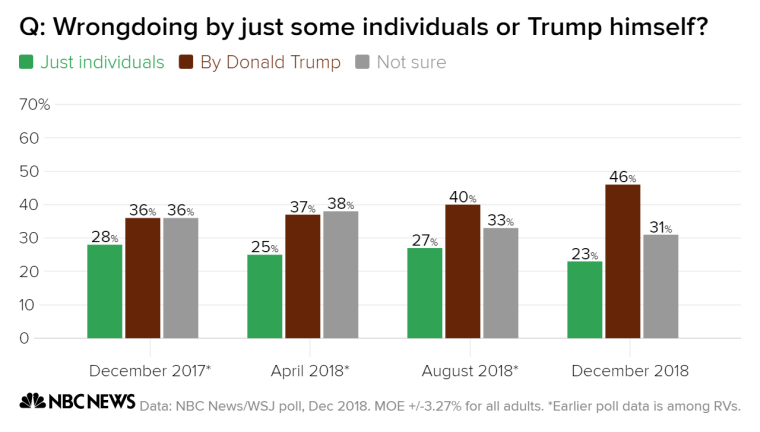Not Believing Trump
Six in 10 Americans say President Donald Trump has been untruthful about the investigation into Russia’s interference in the 2016 presidential campaign, while half of the country says the investigation has given them doubts about Trump’s presidency, according to a new national NBC News/Wall Street Journal poll.
The survey, conducted a month after the results of November’s midterm elections, also finds more Americans want congressional Democrats — rather than Trump or congressional Republicans — to take the lead role in setting policy for the country.
And just 10 percent of respondents say that the president has gotten the message for a change in direction from the midterms — when the GOP lost control of the U.S. House of Representatives but kept its majority in the U.S. Senate — and that he’s making the necessary adjustments.
Glenn Kessler and Scott Clement at WP:
For months, President Trump has claimed that U.S. Steel has announced plans to build more than six new plants. Throughout the midterm election, he repeatedly said that Democrats had signed onto an “open borders” bill. And he has long charged that millions of fraudulent votes were cast in the 2016 election.
None of these claims is true. What’s more, most Americans don’t believe them, according to a new Washington Post Fact Checker poll.
Fewer than 3 in 10 Americans — including fewer than 4 in 10 Republicans — believe these or several other prominent claims by the president, according to the poll.
[Read the full Post Fact Checker poll results]
The poll sought to determine what Americans believe — the truth or the president. The Post has never conducted this type of poll before and it serves as the most comprehensive examination of whether Trump’s false and misleading claims have taken root among the broader American public.
The survey included 18 pairs of opposing statements — one true, one false — without identifying who made the statement. Eleven questions gauging belief in false claims by Trump were mixed among four false claims by Democrats, a true claim by Trump and two probing other factual statements.
Only among a pool of strong Trump approvers — about 1 in 6 adults in the survey — did majorities accept several, though not all, of his falsehoods as true.
